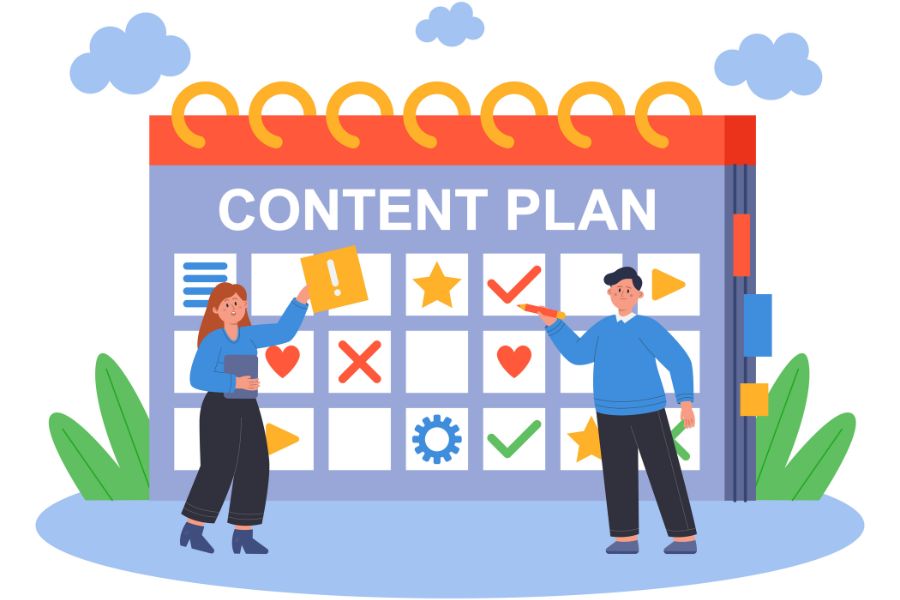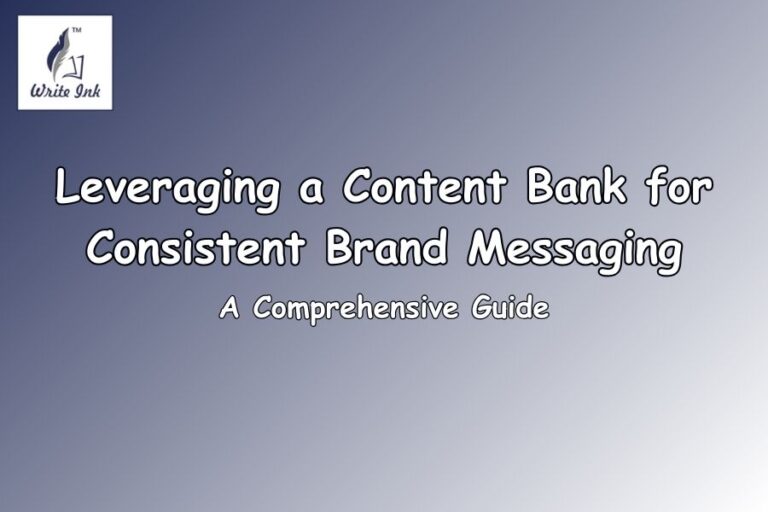The Roadmap to Effective Content Planning
Introduction

In the digital age of contemporary times, having a meaningful and active online presence is like oxygen for your brand or business to survive. After all, if your target audience doesn’t know about the existence and purpose of your brand, product or service, how and why would they buy from you? Furthermore, amidst countless brands and people vying for the audience’s attention, high-quality, well-crafted, unique and authentic content that resonates with the interests, concerns and desires of the audience emerges as the key to stand out and leave a lasting impression.
With a compelling virtual persona and impactful content, you can organically make your brand reach the masses, form a deep connection with your target audience, build brand credibility, drive traffic to your website and boost sales. However, strategic content creation to enhance your brand’s visibility is no easy feat – it requires a lot of time, effort, commitment and, most importantly, an in-depth understanding of digital marketing and what kind of content works best to get it right. Consequently, content planning in digital marketing is a pivotal tool and aspect to streamline the process of creating content and maximise the impact of your content marketing efforts. Whether it’s content planning for social media, website content marketing or SEO blog writing, strategic content planning can make or break your online presence and brand identity.
Unlike what most people believe, content planning is more than just churning out content, creating content calendars or scheduling posts. Content strategy planning constitutes a calculated approach to content creation and a meticulous system of strategising, organising, and disseminating valuable content meant for a well-defined target audience. This comprehensive blog will delve into the nuances and intricacies of content planning and optimisation, which will help you create an effective, well-thought-out and successful website or social media content plan for your brand. Whether you’re a seasoned content marketer or just dipping your toes into the realm of digital content, our expert insights, content planning ideas and content planning tips in this blog will equip you with all the knowledge and tools you need to chalk out the best plan and strategy to grow on social media and surpass your competitors.
What is content planning?

We need to understand what content planning is before diving into its nuances. At its core, content planning involves systematic conceptualisation, creation, organisation and distribution of content across various platforms and marketing channels to ensure that every piece of content you create and publish aligns with your brand identity, serves a distinct purpose, caters to your target audience’s expectations and contributes to your business’s overall objectives. It is a structured and strategic process that employs a consistent and purposeful approach to understand and leverage your target audience’s traits, various optimal content types, messaging, and timing to deliver valuable content.
A content plan, on the other hand, is equivalent to a strategic blueprint or roadmap that guides all your content marketing endeavours.
Let’s have a closer look at the essential attributes of content planning –
- Audience-centric: The first step of content planning is acquiring a deep and thorough understanding of your target audience. Just like you must know the postal address of a recipient while writing a letter to them, you must know your audience to create content targeted towards them. Enquire about and find out your target audience’s traits, needs, preferences, concerns, desires and pain points and tailor your content to address these findings.
- Consistency: An ideal content plan must maintain a consistent and cohesive tone, style, pattern and schedule across all platforms. Consistency in digital content will make your brand discernibly recognisable and significantly more familiar to your audience, boosting trust, credibility and consumer loyalty.
- Tangible and measurable goals: All content planning endeavours should always aim at concrete goals that are attainable as well as trackable through performance metrics and key performance indicators (KPIs). This way, you can easily monitor how your target audience responds and engages with your content over time and determine if any modifications are required. You can also carry out a content quality audit and generate a content audit report to assess if your strategic content marketing tactics live up to your objectives and expectations. Whether the goal is to increase website traffic, generate leads, drive conversions or boost brand awareness, you must be clear about what the content plan needs to accomplish even before you start writing a content strategy and plan.
- Adaptability and versatility: The digital landscape changes in the blink of an eye and evolves every moment. Therefore, content planning must be adaptable to moment marketing and facilitate flexibility to leverage emerging trends. An ideal content plan is characterised by an optimal balance of evergreen and topical posts.
It’s important to note that the importance of content strategy and the significance of content planning go hand in hand; you can have the best content strategy, but it would serve no purpose without a well-devised content plan and vice versa.
Guide to high-level content planning

Creating a strategic and high-level content plan aligning with your business objectives and the target audience’s interests requires a structured and systematic approach. Here’s a step-by-step guide for meticulous, well-crafted and result-oriented content planning –
1) Set clearly defined objectives: The first step of content planning is setting actionable and measurable goals. It would be best to determine what you aim to accomplish with the content plan – whether you want to boost brand awareness, increase sales, generate leads, establish thought leadership or drive more traffic to the website. An effective way to define your objectives is by using the SMART framework to set Specific, Measurable, Achievable, Relevant and Time-bound goals. For instance, if the goal is to boost brand awareness, you can tailor your content plan and content strategy for social media to create content revolving around your brand’s mission, values and USPs. On the other hand, if your objective is to increase website traffic, the content plan and strategy will focus on SEO-friendly blogs and guest articles.
2) Research and understand your target audience: An in-depth understanding of your target audience’s personality traits, demographics, behaviours, values, interests, pain points and desires is an indispensable aspect of content planning and crucial for boosting engagement and conversion rates. Conduct comprehensive research and create a detailed brand consumer profile that vividly encapsulates the persona of your ideal customers and will guide you in creating content that resonates best with them.
3) Conduct industry research and competitive analysis: Identify the topics, formats and social media content trends in your industry and garner favourable responses from your target audience. Study and analyse the content of your direct competitors to understand what kind of content works best and identify gaps. However, leverage these topics and fill the gaps with your unique approach.

4) Brainstorm themes and ideas: Once you’ve familiarised yourself with the target audience, industry trends and competition, it’s time to spin out unique ideas and innovative themes for crafting effective content that aligns with your objectives. Infuse the industry trends and relevant topics with your special touch and distinctive brand style to stand out from the competition and be memorable to the audience.
5) Shortlist content types and topics: Determine the types of social media content you will create – choose from popular formats like blogs, videos, static posts, carousels, infographics, podcasts and newsletters. Also, decide on a set of topics or broad categories (content pillars and topic clusters) you will create your content around.
6) Finalise the post timings and frequency: Establish how often and what time of the day you will be posting the content you create. Ascertain the timings favoured by the platform algorithms and your target audience’s engagement patterns and active timings on a particular platform. This will also help you establish the ideal speed of consistently churning out the required content, facilitating a significantly better content writing plan.
7) Develop an elaborate content calendar: Develop a scrupulous and well-structured content calendar that outlines what content you will create and when you will publish it to maintain consistency and a systematic approach to content creation. Consider the various factors like seasonality, topical posts, holidays and industry trends. Experiment with content scheduling tools and software to organise and automate your content calendar.
8) Plan the content promotion and distribution strategy: Plan how and where to distribute and promote your content to maximise its reach and impact. Compose a promotional checklist specifying the preferred platforms, influencers and channels like your website, blog, social media platforms, email marketing, and guest posting.
9) Allocate resources and assign responsibilities: Once you are done creating a content calendar, you must diligently plan ahead of time to ensure a smooth and uninterrupted content creation and distribution process. Divide the tasks and responsibilities among your team of social media content creators, social media content strategists, strategic content writers, YouTube scriptwriters, designers, editors, videographers, social media managers, etc. Allocate the essential resources like budget and human resources to execute the process of content creation and distribution. Focus on creating high-quality, informative, engaging content that resonates with your audience and aligns with your brand’s voice, values, messaging and objectives.

10) Measure and analyse your content effectiveness: After you’ve successfully executed the content plan, perform a content audit process like a content audit for the website or content audit for social media to evaluate the performance and gauge the success of your content. Identify gaps and opportunities for improvement and refine the content plan to boost the website traffic, engagement rates, conversion rates, and social media reach.
A content plan efficiently amalgamates the SEO content strategy, content calendar and posting schedule to streamline the process of content creation, distribution and iteration.
Why is content planning important?

Alexander Graham Bell once said, “Before anything else, preparation is the key to success.” The very first step of social media, digital and content marketing is laying out a content plan – if you end up skipping this step because you’re too eager to get started, chances are you will lose your way.
Let’s take a closer look at a few reasons why content planning is a prerequisite for successfully marketing your brand
- Consistency: A meticulously crafted content plan helps you ensure that you are consistently delivering relevant and high-quality content to your target audience, keeping them engaged and reinforcing your brand’s presence, purpose and messaging in their minds. Consistency is the key to establishing a robust brand image and securing your audience’s loyalty.
- Relevance and targeted messaging: Content planning facilitates the creation of relevant, resourceful and valuable content that masterfully addresses your target audience’s unique needs, desires, pain points and interests. Whether it’s SEO blog content, web 3.0 content or a social media content template, planning your content and strategy in advance helps you tailor your content to specific audience segments. This leads to higher engagement and conversion rates.
- Efficiency and productivity: Content planning streamlines and optimises the content creation process, making it more efficient, timely and flawless. It enables you to allocate resources, including time, budget and talent, more efficaciously and meet deadlines without compromising quality or enduring last-minute scrambles.

- Alignment with the brand image and objectives: A content plan makes your content seamlessly align with your brand personality profile, vision, values and messaging. Furthermore, content planning allows you to set clear and measurable objectives to gauge how and to what extent your content impacts your broader marketing and business objectives. Whether you aim to attract and convert leads, increase sales or enhance brand profiling, content planning ensures that every content you create contributes directly to achieving your goals.
- Adaptability: A content plan paves the way for adaptability and flexibility to effectively tweak and modify your content and strategy according to evolving industry trends and audience preferences.
- Higher ROI: With a systematic and well-organised content plan in place, you are bound to see improved performance metrics and a higher return on investment (ROI).
- Brand authority: A content plan helps you consistently create and deliver informative and insightful content to your audience, inspiring their trust in your expertise and positioning your brand as an industry authority in your niche.
Types of content planning

When it comes to content planning, there is no one-size-fits-all approach. Whether it’s blog content planning, social media content planning, SEO blog strategy, website content strategy or a B2B content strategy, you can employ various types of content planning based on the nature of your industry, target audience and business objectives. Let’s look at some common types of content planning –
- Editorial content planning: This is the most basic form of content planning. It involves creating a schedule for your content, specifying what will be published and when to maintain consistency and ensure alignment with the brand objectives.
- Campaign-based content planning: Ideal for specific marketing campaigns or product launches, this type of content planning helps you align the content you create with the campaign’s theme and timeline.
- Evergreen content planning: Planning for evergreen content involves conceptualising and creating timeless content that remains relevant and continues to attract and engage your target audience over a long period.
- Seasonal content planning: Perfect for businesses with frequent seasonal fluctuations, this type of content planning focuses on creating content specific to a particular season or holiday in a niche that also caters to the evolving interests of the target audience.
- User-generated content (UGC) content planning: This type of content planning aims to encourage your audience to create content related to your brand to foster community engagement, authenticity and trust.
- Social Media content planning: This type of content planning helps you plan, schedule, create and track your social media content. It involves creating a dedicated social media calendar that outlines the posts, hashtags, and engagement activities across various social media platforms.
- Video content planning: This type of content planning helps you plan, create and schedule compelling and shareable videos that resonate with your audience and boost your content’s reach and brand awareness.
- Email marketing or newsletter content planning: This type of content planning involves planning email campaigns, newsletters, and automated sequences that drive leads and engage your subscribers.
Each type of content planning serves a distinct purpose and can be used individually or in combination, depending on your specific needs. You can opt for a holistic approach and utilise several of the above types in proportion to meet your content marketing goals.
Benefits of content planning

Content planning offers a multitude of benefits for your brand and content marketing endeavours. Here are a few of them –
- Competitive edge: Crafting a well-thought-out content plan and executing it is the key to setting yourself apart from your competitors and transforming your brand’s digital presence into a go-to resource for your target audience.
- Enhanced and optimised collaboration: A content plan fosters better collaboration and communication within your team by promoting a systematic division of tasks and responsibilities to achieve a common objective.
- Improved SEO: Strategic content planning enables you to optimise your content for the search engines, drive more traffic, get better SEO rankings and boost organic visibility more effectively.
- Performance tracking: A content plan incorporates content audit ideas, regular performance tracking and data-driven modifications for improved outcomes over time.
Conclusion

As content reigns supreme in today’s digital age, content planning is no longer just an option but necessary to build a notable and persuasive online presence. The secret behind every successful content strategy template is creating the best possible content at an ideal time and for the right audience. Without a detailed strategy and well-defined plan in place, your content marketing efforts may lack a precise direction and purpose, resulting in unutilised or underutilised opportunities and misuse of resources. A content plan that aligns with your business objectives and resonates with your target audience is the key to elevating your brand’s presence and creating a profound impact in the digital world.
Remember that content planning and writing are not one-time tasks. Content planning is an ongoing process that necessitates continual efforts, persistent commitment, constant evaluation, regular audits and frequent modifications to continuously deliver original, valuable, authentic, resourceful and engaging content to your audience. It would be best to keep learning more about your audience, assessing your content’s performance, gathering feedback, refining your content strategy and reevaluating and updating your content plan to keep your audience hooked and propel your brand to new heights.
Lastly, doing it all on your own is great, but when it comes to a content plan that yields tangible results for your brand and business, the best option is leaving it up to the experts of a content creation agency. Write Ink boasts years of experience and expertise to make your brand skyrocket to the top! Contact us today for a customised content plan and strategy for your brand and curated posts to accelerate your online presence. We offer various content services like strategic content writing, SEO content writing, website content services, content audit services, branding content strategy, social media content writing, social media content strategy, social media content ideas, website content and SEO and SEO blog articles. Visit our website for more details.
Image Reference: freepik.com







